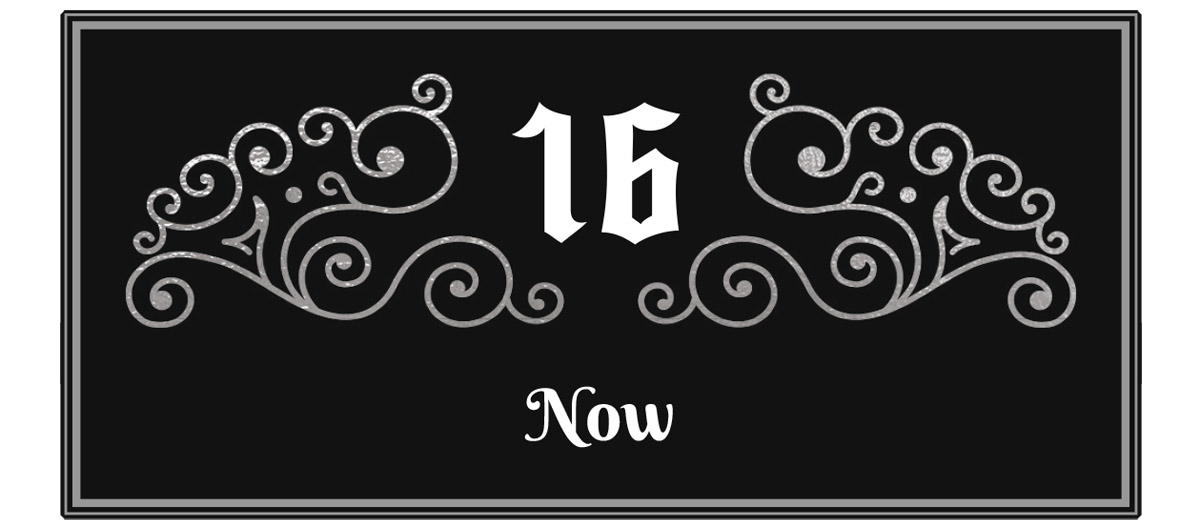QUINN LEADS ME THROUGH A COFFEE SHOP PAST MISmatched couches of three different vintage orange-and-green floral patterns, reminiscent of the ’70s, and one of olive green crushed velvet. Each host to tables from vastly different eras—mid-century modern, someone’s garage sale a few decades ago, an Amish woodworker a year ago—and various low-slung faux-leather chair seating, some corners of seating finished with aquariums and all punctuated by years-old coffee rings. Retro diner, office, and elementary school chairs in various states of disrepair—some glittery blue vinyl, some a sickening aqua or yellow metal, all with quasi-threadbare cushions—scatter around two-person tables painted with cribbage and chess boards, their pieces occupying small wooden boxes on the bookshelf that boasts a smattering of abandoned books and board games whose missing pieces have been replaced by customer-made variants. No two lamps, nor their shades, so much as complement one another and, in that, the entire place glows with a homey warmth.
Along the eastern exposed brick wall of the original architecture, local artists—likely long since passed through this area—have displayed their work. Despite the eclectic assortment, all seem curated with a semi-industrial aesthetic: stormtroopers join a Victorian family for a black-and-white portrait, Darth Vader assuming the role of father and sitting with a lightsaber, the only flash of color, across his lap; a panel of a noir comic wherein a woman holds a shotgun, the scene built of mosaic tiles from what could be DIY band flyers or other advertisements or fragments of the artist’s other work; a black-and-white-and-shades-of-gray painting of a couple wearing gas masks in a romantic embrace, the date 05.05.03 underneath. Each other wall plays host to similarly dissimilar art, curated by the owners and staff over many years. Some names I recognize from gallery debuts Zeke insisted I accompany him to when etiquette mandated he accept invitations to social engagements; others hung desperately, perhaps awaiting discovery by a wealthy patron or as a favor from one of the staff.
No doubt, this place exists because of, and for, regulars. Quinn motions for me to follow her through a thick fabric curtain into a labyrinth of back rooms, some storage, most with closed doors. She stops in front of one such door and puts out her hand to stop me as she dips inside and lets the door click immediately behind her. She emerges maybe two minutes later.
“It is done. Morgeaux will stay here until it is safe for her to return to her life—if she wants to return to her life. Otherwise she can start over here,” she explains, indicating the coffee shop with her hands as we make our way further into the labyrinthine series of rooms.
“Morgeaux?”
Quinn shrugs. “She had a name tag on. Come on,” she says, opening another closed door which leads out into the night at the rear of the coffee shop. “We should talk.”

“Ezekiel had been searching for us for years, but what he didn’t know is that we’d been following him nearly as long,” she starts, not mincing words.
I cross my arms over my chest and listen—what else can I do?—and offer no indication that I do or don’t believe her, so she goes on.
“The Seeker was meeting someone—as you found out last night—” I raise my eyebrow at the intrusion but she continues without noticing, “—but he didn’t need the lead offered by the Crusader to find us. He already had, though he didn’t know it at the time.”
“The Crusader?”
“Delilah, this is going to take a long time if you keep interrupting,” she sighs. “All will be made clear, I promise.” I purse my lips and glare. In that moment she sounded a lot like Zeke and I felt a lot like I didn’t need to be scolded by some woman who didn’t know me. “Anyway, Ezekiel didn’t need the lead, but he needed the Crusader to think the deal was legitimate so he would take what Ezekiel offered—so he let the Crusader believe he needed it.”
“So this . . . Crusader . . . he gave Zeke a lead to find you, but what did Zeke give him in exchange?”
“An address.”
I raise an eyebrow and cock my head slightly to indicate that I expect more.
“He gave the Crusader Ismae the Bloody. Or, rather, where to find her.”
“No,” I state flatly, shaking my head.
“What?”
“Did I stutter? I said no. That’s—that’s not possible.”
“Listen to your blood, Delilah. A part of you knows I tell the truth.”
“No. Zeke was a Keeper, and a loyal one at that. He’d never betray the sect by handing over a Praedari Elder. Not that he’d even know where to find Ismae if they came knocking. She was his Usher but their relationship ended there, a long time ago.”
“You’re half-right,” she starts carefully. “He hasn’t seen her in a long time, at least since she entered into the Slumber, and I cannot tell you how long before that. But Delilah, Ezekiel died that night and it wasn’t the Crusader who killed him.”
Every muscle in me tenses as the predator within rouses. This, the truth I’ve been seeking, the only thing I’ve thought about since his body became ash, poised on this stranger’s lips, about to spill into this moment and be forever gone. Once said it can never be unsaid—like so many things that passed between Zeke and me in our most intimate moments, like so many things uttered into the night since the beginning of time.
“Delilah, I am the one who killed Ezekiel Winter.”
